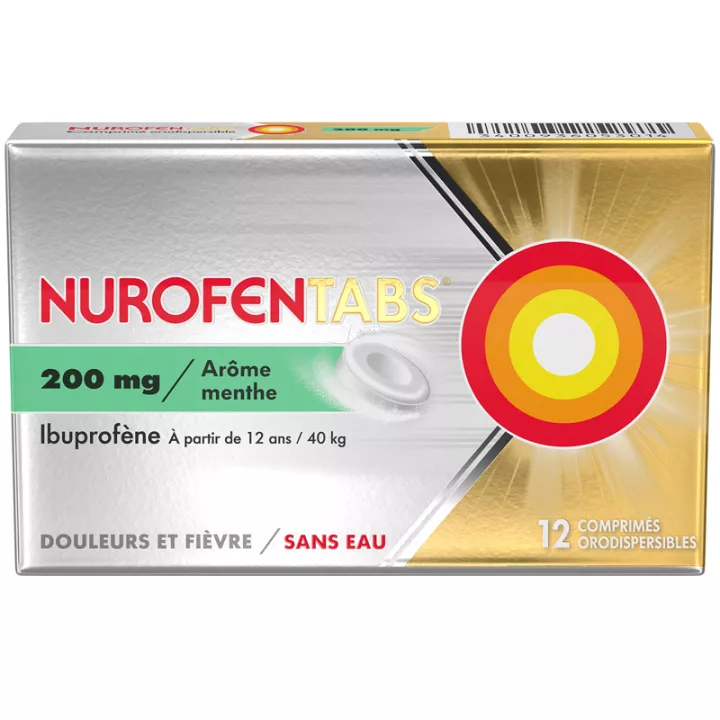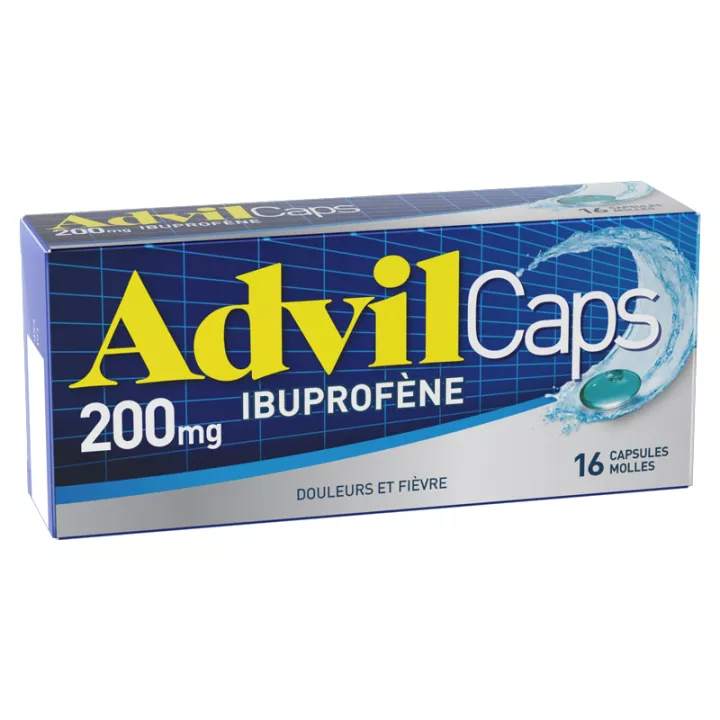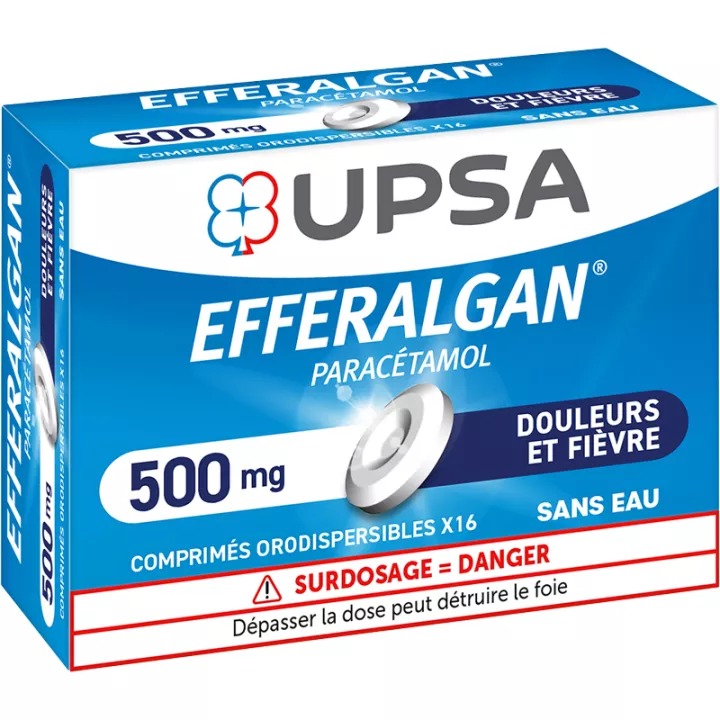NOTICE
ANSM - Updated on: 03/07/2017
Name of the medicinal product
NUROFENTABS 200 mg orodispersible tablet
Ibuprofen
framed
Please read this leaflet carefully before you start taking this medicine because it contains important information for you.
You should always take this medication exactly as prescribed in this leaflet or by your doctor or pharmacist.
· Keep this leaflet. You might need to read it again.
· Ask your pharmacist for advice or information.
· If you experience any of the side effects, talk to your doctor or pharmacist. This also applies to any side effects not mentioned in this leaflet. See section 4.
· You should contact your doctor if you experience no improvement or feel less well after:
o 3 days for teenagers
o 3 days for fever and 4 days for pain in adults.
Do not use this medication for children.
What is in this leaflet?
1. What is NUROFENTABS 200 mg orodispersible tablet and in which cases it is used?
2. What should I tell you before taking NUROFENTABS 200 mg orodispersible tablet?
3. How to take NUROFENTABS 200 mg orodispersible tablet?
4. What are the possible side effects?
5. How to store NUROFENTABS 200 mg orodispersible tablet?
6. Package contents and other information.
1. WHAT IS NUROFENTABS 200 mg ORODISPERSIBLE AND IN WHICH CASES IS USED?
Pharmacotherapeutic group: anti-inflammatory and antirheumatic, non-steroidal; derived from propionic acid, ATC code: M01AE01
NUROFENTABS 200 mg orodispersible tablet contains 200 mg of ibuprofen. Ibuprofen belongs to a group of medicines called non-steroidal anti-inflammatory drugs (NSAIDs). These medications provide relief by altering how the body responds to pain, edema and high temperature.
NUROFENTABS 200 mg orodispersible tablet is indicated in adults and adolescents over 40 kg (12 years and older) in the symptomatic treatment of mild to moderate pain such as headache, dental pain, painful periods, and fever.
2. BEFORE YOU TAKE NUROFENTABS 200 mg orodispersible tablet?
Never take NUROFENTABS 200 mg orodispersible tablet:
· allergic reaction (hypersensitivity) to ibuprofen or any of the other ingredients of NUROFENTABS 200 mg orodispersible tablet (see section 6 "Additional Information");
· history of shortness of breath, asthma, runny nose, swollen face and / or hands or urticaria after using ibuprofen, aspirin or other similar painkillers (NSAIDs);
· severe hepatic, renal or cardiac insufficiency;
· ulcer or bleeding of the stomach or duodenum (peptic ulcer), whether progressive or old (two or more episodes);
· history of bleeding or gastrointestinal perforation related to previous NSAID treatment;
· cerebrovascular haemorrhage or other evolving hemorrhage;
· patients with unexplained hematopoiesis disorders.
· severe dehydration (caused by vomiting, diarrhea or insufficient fluid intake);
· during the last three months of pregnancy (see below).
· In the case of phenylketonuria (hereditary disease detected at birth), due to the presence of aspartame.
Warnings and Precautions
Talk to your doctor or pharmacist before taking NUROFENTABS 200 mg orodispersible tablet .
· If you suffer from certain skin conditions (systemic lupus erythematosus (SLE) or mixed connective tissue disease).
· If you suffer from severe skin reactions such as exfoliative dermatitis, Stevens-Johnson syndrome and toxic epidermal necrolysis. The use of NUROFENTABS should be discontinued immediately upon the first occurrence of skin rash, mucosal lesions or any other signs of allergic reactions.
· If you have inherited disorders of blood formation (eg acute intermittent porphyria).
· If you suffer from bleeding disorders.
· If you have or have ever had an intestinal disease (ulcerative colitis or Crohn's disease).
· If you have reduced renal function.
· If you have liver problems.
· If you are trying to get pregnant.
· If you have or have had asthma or allergic diseases as shortness of breath may appear.
· If you suffer from hay fever, nasal polyps or chronic obstructive pulmonary disease, there is an increased risk of allergic reactions. Allergic reactions can manifest as asthma attacks (so-called analgesic asthma). Edema or urticaria of Quincke.
· In the course of chickenpox, it is advisable to avoid the use of NUROFENTABS 200 mg orodispersible tablet.
· In case of prolonged administration of NUROFENTABS 200 mg orodispersible tablet, regular monitoring of liver parameters, renal function, as well as blood form is required.
· Adverse effects can be minimized by using the lowest effective dose for the shortest duration.
· Seniors have an increased risk of side effects.
· In general, the usual use of (several kinds of) analgesics can lead to serious persistent kidney problems. This risk can be increased in case of physical effort associated with salt loss and dehydration. Therefore, this should be avoided.
· Prolonged use of an analgesic treatment to treat headaches can aggravate them. If this situation is experienced or suspected, medical advice must be obtained and treatment must be discontinued. The diagnosis of overuse of headache medication should be suspected in patients with frequent or daily headache despite (or because) of regular use of medication for headaches.
· Concomitant use of NSAIDs, including specific cyclooxygenase-2 inhibitors, increases the risk of adverse effects (see section "Other medicines" below) and should be avoided.
· There is a risk of kidney failure in dehydrated adolescents.
· Special medical supervision is required immediately after major surgery.
· NSAIDs may mask the symptoms of infection and fever.
· Anti-inflammatory / analgesic drugs such as ibuprofen are likely to be associated with a slightly increased risk of heart attack or stroke, especially when used at high doses. Do not exceed recommended dosage or treatment time.
· If your doctor has told you about an intolerance to some sugars, contact your doctor before taking this medicine.
Discuss your treatment with your doctor or pharmacist before taking NUROFENTABS 200 mg orodispersible tablet if you:
· have heart problems, heart failure, angina (chest pain) or have had a heart attack, surgical bypass, peripheral arterial disease (poor circulation in the legs or feet due to narrowed arteries or blocked) or any type of stroke (including "mini-strokes" or transient ischemic attacks (TIAs)).
· have high blood pressure, diabetes, high cholesterol, a family history of heart disease or stroke, or if you are a smoker.
Other medicines and NUROFENTABS 200 mg orodispersible tablet
Inform your doctor or pharmacist if you are taking, have recently taken or may take any other medicines.
NUROFENTABS 200 mg orodispersible tablet is likely to affect or be affected by certain other medications. For example :
· anti-coagulant drugs (ie, which fluidize the blood / prevent the appearance of clots such as aspirin / acetylsalicylic acid, warfarin, ticlopidine);
· medicines that reduce high blood pressure (ACE inhibitors such as captopril, beta-blockers such as atenolol, angiotensin-II receptor antagonists such as losartan)
Some other medicines are also likely to affect or be affected by treatment with NUROFENTABS 200 mg orodispersible tablet.
Inform your doctor or pharmacist if you are taking or have recently taken any other medicines, including medicines obtained without a prescription. Especially if you take:
· digoxin (for heart failure), because the effect of digoxin may be accentuated;
· glucocorticoids (medicines containing cortisone or cortisone-related substances) as these drugs may increase the risk of gastrointestinal ulcers or bleeding;
· antiplatelet agents, as they may increase the risk of bleeding;
· of phenytoin (for epilepsy), because the effect of phenytoin may be accentuated;
· selective serotonin reuptake inhibitors (drugs used for nerve depression) as they may increase the risk of gastrointestinal bleeding;
· lithium (drug for manic depressive illness and depression), because the effect of lithium can be accentuated;
· probenecid and sulfinpyrazone (medication for gout), as excretion of ibuprofen may be delayed;
· potassium-sparing diuretics as this may lead to hyperkalaemia;
· methotrexate (a medicine for cancer or rheumatism) because the effect of methotrexate may be accentuated;
· tacrolimus and ciclosporin (immunosuppressive drugs), as the kidneys may be damaged;
· zidovudine (a drug for the treatment of AIDS) because with the use of NUROFENTABS 200 mg orodispersible tablet there is an increased risk of haemarthrosis and hematomas in hemophiliac patients with HIV;
· sulphonylureas (antidiabetic medication) because interactions are possible;
· quinolones (antibiotics), since their use may increase the risk of convulsions;
· cytochrome CYP2C9 inhibitors as administration of ibuprofen in combination with cytochrome CYP2C9 inhibitors may increase exposure to ibuprofen (CYP2C9 substrate). In a study with voriconazole and fluconazole (CYP2C9 inhibitor), an increase in the exposure of ibuprofen S (+) by approximately 80 to 100% was shown. Reduced doses of ibuprofen should be considered when cytochrome CYP2C9 inhibitors are concomitantly administered, particularly when high doses of ibuprofen are administered in combination with voriconazole or fluconazole.
· Other NSAIDs including selective cyclooxygenase 2 inhibitors as this may increase the risk of gastrointestinal ulceration or bleeding.
· Low dose acetylsalicylic acid because the effect of the anticoagulant can be altered.
· blood thinners (such as warfarin) because ibuprofen can increase the effects of these drugs
· medicines for high blood pressure and diuretics because ibuprofen can decrease the effects of these drugs with a possible increased risk for the kidneys;
NUROFENTABS 200 mg, orodispersible tablet with food, drink and alcohol
It is recommended for patients with gastric sensitivity to take NUROFENTABS 200 mg orodispersible tablet during a meal.
Pregnancy, breast-feeding and fertility
If you are pregnant or breastfeeding, think you may be pregnant or plan a pregnancy, ask your doctor or pharmacist for advice before taking this medicine.
Pregnancy
Do not take this medication during the last 3 months of pregnancy. This medication should not be taken during the first 6 months of pregnancy except on medical advice.
feeding
This medication passes into breast milk, but it can be used during breastfeeding provided that the recommended dose is used for the shortest possible period of time.
Female fertility
Avoid taking this medication if you are trying to get pregnant.
Sport
Not applicable.
Driving and using machines
For short-term treatment, this medicine has no or little influence on the ability to drive and use machines.
NUROFENTABS 200 mg orodispersible tablet contains aspartame a source of phenylalanine which may be harmful in patients with phenylketonuria.
This medicine contains sorbitol. If your doctor has told you about an intolerance to some sugars, contact your doctor before taking this medicine.
3. HOW TO TAKE NUROFENTABS 200 mg orodispersible tablet?
NUROFENTABS 200 mg orodispersible tablet should not be used in children under 12 years of age.
In the adolescent
If treatment should be continued for more than 3 days or if symptoms worsen, consult a physician.
In the adult
Consult a doctor if your symptoms worsen or do not improve after 3 days in case of fever or after 4 days of treatment in case of pain.
Dosage, Mode and / or route (s) of administration, Frequency of administration and Duration of treatment
Dosage
Always take this medication exactly as prescribed in this leaflet. Check with your doctor or pharmacist if in doubt.
The usual dosage is as follows:
Age | dose (orodispersible tablet) | Daily dose (orodispersible tablet) |
Adolescents over 12 and adults | 1 to 2 | Initial dose: 1 to 2 orodispersible tablets (200 mg to 400 mg ibuprofen) and if necessary 1 to 2 orodispersible tablets (200 mg or 400 mg of ibuprofen) every 4 to 6 hours. Do not exceed more than 6 orodispersible tablets (1200 mg ibuprofen) per 24 hours. |
Method and route of administration
· Place a tablet on the tongue, let it melt and swallow. The water intake is not necessary.
· Talk to your doctor or pharmacist if you think the effect of this medicine is stronger or weaker than you thought.
If you take more NUROFENTABS 200 mg orodispersible tablet than you should:
Consult your doctor immediately. The following signs may occur: nausea, vomiting, stomach pain, or more rarely diarrhea. In addition, headache, gastrointestinal bleeding, dizziness, dizziness, drowsiness, nystagmus, vision problems, ringing in the ear, low blood pressure, arousal, disorientation, convulsions, coma, loss of consciousness, hyperkalaemia, metabolic acidosis, increased prothrombin time / INR, acute renal failure, liver damage, respiratory depression, cyanosis and exacerbation of asthma in asthmatics.
If you have any further questions about the use of this product, ask your doctor or pharmacist.
If you forget to take NUROFENTABS 200 mg orodispersible tablet:
Do not take a double dose to make up for the tablet you have forgotten to take.
If you stop taking NUROFENTABS 200 mg orodispersible tablet:
Not applicable.
If you have any further questions on the use of this medication, ask your doctor or pharmacist.
4. WHAT ARE POSSIBLE SIDE EFFECTS?
Like all medicines, this medicine may cause side effects, although not everybody gets them.
The occurrence of adverse events can be minimized by the use of the minimal dose during the shortest treatment time necessary to relieve symptoms. You may have one of the known side effects of taking NSAIDs (see below). If this is the case, or if you have any concerns about taking this medication, stop the medication and talk to your doctor as soon as possible. Elderly people taking this medication increase their risk of developing health problems related to side effects.
Stop taking this medication and seek immediate medical attention if you develop:
· signs of intestinal haemorrhage such as severe abdominal pain, tarry black stools, vomiting of blood or dark particles resembling ground coffee;
· signs of very rare but severe allergic reactions such as worsening of asthma, wheezing or unexplained breathlessness, swelling of the face, tongue or throat, difficulty breathing, tachycardia or fall in blood pressure leading to collapse. Such reactions may occur even if this is the first time you are using this medication;
· severe skin reactions such as skin rashes covering the entire body, desquamation, vesication or detachment of the skin.
Tell your doctor if you experience any of the following side effects:
Common (can affect up to 1 in 10 people)
· stomach pain such as acid burning, stomach pain and nausea, indigestion, diarrhea, vomiting, flatulence (gas), constipation and slight loss of blood in the stomach and / or intestine which can cause anemia in exceptional cases.
Uncommon (can affect up to 1 in 100 people)
· gastrointestinal ulcers, perforation or haemorrhage, inflammation of the mucous membrane of the mouth with ulceration, aggravation of existing intestinal disease (ulcerative colitis or Crohn's disease); gastritis;
· central nervous system disorders such as headache, dizziness, insomnia, restlessness, irritability or fatigue;
· visual impairment;
· various rashes;
· hypersensitivity reactions with urticaria and itching.
Rare (can affect up to 1 in 1000 people)
· tinnitus (ringing in the ear);
· increased uric acid levels in the blood, pain in the flanks and / or abdomen, blood in the urine and fever may be signs of alteration of the kidneys (papillary necrosis);
· decrease in hemoglobin levels.
Very rare (can affect up to 1 in 10,000 people)
· oesophagitis, pancreatitis and formation of intestinal stenosis of the diaphragm type;
· heart failure, heart attack and swelling of the face or hands (edema);
· decreased urination and swelling (especially in patients with high blood pressure or decreased renal function), swelling (edema) and turbid urine (nephrotic syndrome); inflammatory diseases of the kidney (interstitial nephritis) which can lead to acute renal failure. If any of the above symptoms occur or if you have a general feeling of alteration, stop taking NUROFENTABS and see your doctor immediately as this may be the first sign of impaired renal function or renal impairment ;
· psychotic reactions, depression;
· arterial hypertension, vasculitis;
· palpitations;
· dysfunction of the liver, liver damage (early signs may be discolouration of the skin), especially during long-term treatment, liver failure, acute liver inflammation (hepatitis);
· problems in the production of blood cells. The first signs are fever, sore throat, superficial buccal ulcers, flu-like symptoms, severe fatigue, nose and skin bleeding and unexplained bruising. In these cases, you should stop treatment immediately and see a doctor. Any self-medication with analgesics or medicines that reduce fever (antipyretic drugs) should not be taken;
· severe skin infections and soft tissue complications during chickenpox;
· aggravation of infection-related inflammations (eg, necrotizing fasciitis) associated with the use of certain analgesics (NSAIDs) has been described. If signs of infection occur or worsen, you should report this to your doctor without delay. It is worth considering whether there is any indication for anti-infectious / antibiotic therapy;
· symptoms of aseptic meningitis with neck stiffness, headache, nausea, vomiting, fever or disorientation have been observed when using ibuprofen. Patients with autoimmune diseases (systemic lupus erythematosus, mixed connective tissue diseases) are more likely to be affected. Contact a doctor immediately if these symptoms occur;
· (eg, Stevens - Johnson syndrome, erythema multiforme, toxic epidermal necrolysis / Lyell syndrome), hair loss (alopecia), severe skin reactions such as rashes with redness and blisters.
Frequency not known (can not be estimated from available data)
· reactivity of the respiratory tract including asthma, bronchospasm or dyspnea.
Drugs such as NUROFENTABS 200 mg orodispersible tablet may be associated with a mild increase in the risk of heart attack ("myocardial infarction") or stroke.
Declaration of side effects
If you experience any side effects, talk to your doctor or pharmacist. This also applies to any side effects not mentioned in this leaflet. You can also report adverse reactions directly via the national reporting system: National Agency for the Safety of Medicines and Health Products (ANSM) and network of Regional Centers of Pharmacovigilance - Website: www.ansm.sante.fr
By reporting adverse reactions, you are helping to provide more information about the safety of the drug.
5. HOW TO STORE NUROFENTABS 200 mg orodispersible tablet?
Keep this medicine out of the reach and sight of children.
Do not use this medicine after the expiry date which is stated on the carton and the blister . The expiry date refers to the last day of that month.
Do not store above 25 ° C.
Do not throw any medication into drains or household waste. Ask your pharmacist to remove any medications you are no longer using. These measures will help protect the environment.
6. PACKAGE CONTENTS AND OTHER INFORMATION
What NUROFENTABS 200 mg orodispersible tablet contains
· The active substance is:
Ibuprofen ................................................. .................................................. 200 mg
For a tablet.
· The other components are:
Ethylcellulose, hydrated precipitated silica, hypromellose, mannitol, aspartame (E951), croscarmellose sodium, magnesium stearate, mint flavor (contains sorbitol).
What is NUROFENTABS 200 mg orodispersible tablet and contents of the pack
This medication is in the form of an orodispersible tablet; boxes of 4, 6, 10, 12, 18, 20, 24, 30, 36, 40 and 48 tablets. Not all pack sizes may be marketed.
Marketing Authorization Holder
Reckitt Benckiser Healthcare France
38 RUE VICTOR BASCH
91300 MASSY
Marketing Authorization Operator
RECKITT BENCKISER HEALTHCARE FRANCE
38 RUE VICTOR BASCH
CS 11018
91305 MASSY CEDEX
Maker
RECKITT BENCKISER HEALTHCARE INTERNATIONAL LIMITED
NOTTINGHAM SITE - THANE ROAD
NOTTINGHAM
NOTTINGHAMSHIRE - NG90 2DB
UK
Names of the medicinal product in the Member States of the European Economic Area
This medicinal product is authorized in the Member States of the European Economic Area under the following names: In accordance with the regulations in force.
[To be completed at a later date by the holder]
The last date on which this leaflet was revised is:
[to be completed later by the holder]
Other
Detailed information on this medicine is available on the ANSM website (France).
Health Education Council:
"WHAT TO DO IN THE EVENT OF FEVER":
The normal temperature of the body varies from one individual to another and is between 36 ° 5 and 37 ° 5. An increase of more than 0 ° 8 is considered a fever.
In adults and children over 12 years of age : If the disorder is too troublesome, you can take a medication containing ibuprofen at the indicated dosage.
With this medication, the fever should drop rapidly, nevertheless :
· if other signs appear (such as a rash),
· if the temperature persists for more than 3 days or if it worsens,
· if the headache becomes violent, or in case of vomiting,
CONSULT YOUR DOCTOR IMMEDIATELY.
"WHAT TO DO IF PAIN":
· In the absence of improvement after 3 days of treatment in adolescents and 4 days of treatment in adults,
· If the pain returns regularly,
· If they are accompanied by fever,
· If they wake you up at night.
CONSULT YOUR DOCTOR.











